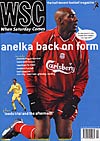 The world is against Leeds United if you believe David O'Leary's vision of events. Mike Ticher takes issue with a spiky work of self-defence
The world is against Leeds United if you believe David O'Leary's vision of events. Mike Ticher takes issue with a spiky work of self-defence
Football clubs are not open institutions and successful managers, on the whole, are not warm and fuzzy people. To be really good at the job you have to be a hard bastard of one type or another. The same is true of many chairmen, who are led to concentrate so intensely on what seems best for their club that the whole of the outside world is filtered through the needs of XXFC. These are hardly original insights, but they are strongly reinforced by Leeds United On Trial. Despite the storm over the book’s amazingly crass timing and title, it probably provides more evidence about the nature of football clubs in general than it does about Leeds United and David O’Leary in particular.
Defending its publication, O’Leary said there was “only one chapter” in the book on the Bowyer and Woodgate case. In fact, three of the nine chapters cover the two trials at Hull Crown Court and the book would be a distinctly unappealing publishing prospect if its only content were the warmed-over match reports that make up most of the intervening fare. There is also some fairly extensive material on O’Leary’s father’s heart bypass which, without wishing to seem callous, is simply irrelevant.
The sense of the football club as victim, suggested by the title of the book, is the predominant theme. Observers of O’Leary on television will be familiar with his plaintive, wheedling manner and his reluctance to admit to even the most brutal offences committed by his players on the pitch. That much is evident here, from his claim that Alan Smith “never moans” to his euphemistic insistence that David Batty’s forearm “unfortunately clipped Joe Cole’s face” in an incident that led to Batty’s sending-off at Upton Park last April (a decision he described as “disgraceful” at the time).
O’Leary’s attitude to the trial of his two players is identical. While he condemns outright the assault on Sarfraz Najeib, and slams Bowyer and Woodgate for their drunkenness, he is at pains to accentuate the cost to Leeds United at every turn and to cast aspersions on those who sought to use the case to throw an unwelcome spotlight on the club. This defensiveness verges on paranoia when he claims that “the process was being driven by a misplaced idea of political correctness”, that the scheduling of the first trial was influenced by a “political agenda” or that the judge’s refusal to cut short the second trial was due to a “political undercurrent”. It is never clear exactly who is out to get Leeds United, though the media are certainly to blame for the bad publicity and the FA, with its “elements of New Labour”, are clearly outside the walls too.
Above all, it is the issue of race that inflames O’Leary. Naturally, he relies on the fact that the prosecution declined to offer evidence that the assault had a racial motive, in order to attack those who would put such a “slur” on his players. He introduces his own experiences of prejudice towards Irish people in England as one means of establishing his credentials on the subject and, much less convincingly, the fact that Leeds have a black masseur and an Asian player on their staff.
This is not really good enough. Whatever the facts given in court, the football club’s position in the city requires it to have a certain understanding of how the case would be read in the Asian community, and why. That is entirely absent. Instead, we hear twice that O’Leary has received hate mail threatening him with a “Jihad” and much about the impact of such letters and phone calls on his family and employees at Elland Road. No doubt that was terrible, but it is hard to see how airing it in this way benefits anyone, least of all his wife and children.
It is a shame Leeds have responded how they have. This book, and Peter Ridsdale’s breathtaking assertion that he knew little or nothing about it (even though it was written in collaboration with the club’s head of communications, David Walker), will only serve to set them deeper in what even O’Leary admits has become “a siege mentality”.
At the start of the book O’Leary says that when he took over at Elland Road he had a vision of a new Leeds, far removed from the “cynical and brutal” Revie years epitomised by Johnny Giles (O’Leary is a master at settling scores in casual asides). Leeds are certainly a different club now, but they are very far indeed from being admired throughout the country as he would like. To get anywhere near achieving that, they will have to start by abandoning the “us against the world” attitude that serves the club so well in getting results on the pitch, but so badly in almost every other respect.
From WSC 180 February 2002. What was happening this month